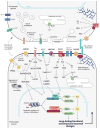Astrocyte glycogen and lactate: New insights into learning and memory mechanisms
- PMID: 29076603
- PMCID: PMC5903986
- DOI: 10.1002/glia.23250
Astrocyte glycogen and lactate: New insights into learning and memory mechanisms
Abstract
Memory, the ability to retain learned information, is necessary for survival. Thus far, molecular and cellular investigations of memory formation and storage have mainly focused on neuronal mechanisms. In addition to neurons, however, the brain comprises other types of cells and systems, including glia and vasculature. Accordingly, recent experimental work has begun to ask questions about the roles of non-neuronal cells in memory formation. These studies provide evidence that all types of glial cells (astrocytes, oligodendrocytes, and microglia) make important contributions to the processing of encoded information and storing memories. In this review, we summarize and discuss recent findings on the critical role of astrocytes as providers of energy for the long-lasting neuronal changes that are necessary for long-term memory formation. We focus on three main findings: first, the role of glucose metabolism and the learning- and activity-dependent metabolic coupling between astrocytes and neurons in the service of long-term memory formation; second, the role of astrocytic glucose metabolism in arousal, a state that contributes to the formation of very long-lasting and detailed memories; and finally, in light of the high energy demands of the brain during early development, we will discuss the possible role of astrocytic and neuronal glucose metabolisms in the formation of early-life memories. We conclude by proposing future directions and discussing the implications of these findings for brain health and disease. Astrocyte glycogenolysis and lactate play a critical role in memory formation. Emotionally salient experiences form strong memories by recruiting astrocytic β2 adrenergic receptors and astrocyte-generated lactate. Glycogenolysis and astrocyte-neuron metabolic coupling may also play critical roles in memory formation during development, when the energy requirements of brain metabolism are at their peak.
Keywords: development; emotional arousal; glia; glucose; glycogenolysis; glycolysis; metabolism.
© 2017 Wiley Periodicals, Inc.
Conflict of interest statement
The authors declare they have no conflicts of interest
Figures



References
-
- Adamsky A, Goshen I. Astrocytes in memory function: Pioneering findings and future directions. Neuroscience 2017 - PubMed
Publication types
MeSH terms
Substances
Grants and funding
LinkOut - more resources
Full Text Sources
Other Literature Sources
Medical
Molecular Biology Databases

